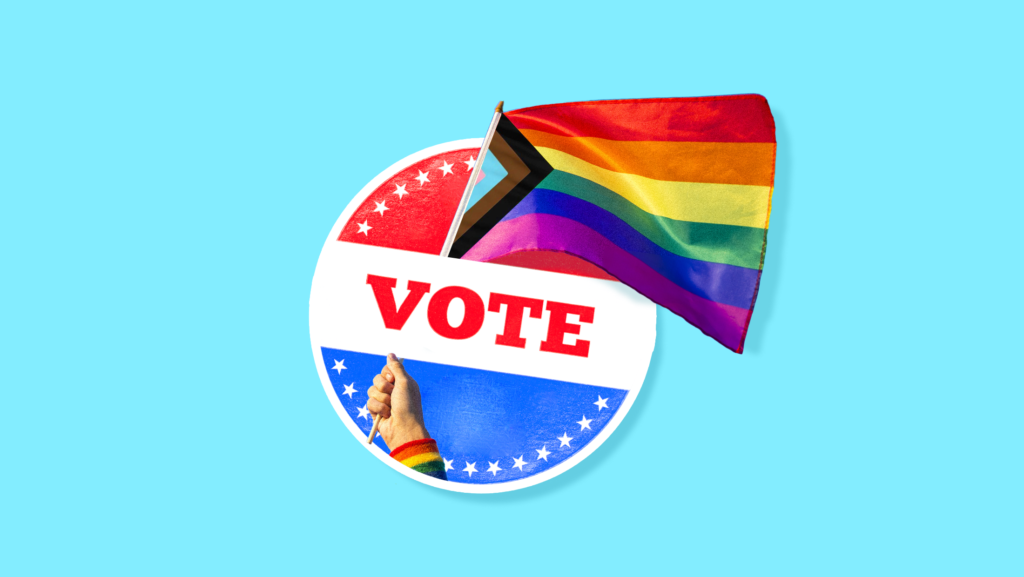We’re Looking for 22,544 LGBTQ+ People To Run for Office — Here’s Why

Even though November 2020 was the strongest showing for LGBTQ+ candidates in history, America has a long way to go before the number of LGBTQ+ state legislative candidates rivals the diverse constituents they represent.
As of 2020, roughly 5% of U.S. adults identify as LGBTQ+. Of the half-million or so elected officials, only 0.17% identify as LGBTQ+. According to the Victory Institute, that means 22,544 more LGBTQ+ candidates would need to be elected to office to achieve “equitable representation” in our state legislatures.
Representation is not the only path to power, but without adequate LGBTQ+ representation in government, the LGBTQ+ community will never have true power. After all, we have seen what happens when Republican-led legislatures with limited LGBTQ+ representation govern unchecked — they’ve cracked down hard on equal access to voting, reproductive freedom and especially LGBTQ+ rights.
Too often, progressives are stuck playing defense: From overtly biased legislation like “bathroom bills” to, most recently, the Supreme Court ruling against the rights of LGBTQ people to foster children in Philadelphia, the views of bigoted lawmakers are dominating the legislative priorities. While public outrage can help — a combination of corporate pushback and grassroots advocacy killed a voter suppression bill in Texas and the state of North Carolina was threatened with losing approximately $3.67 billion in business revenue over proposed LGBTQ rights restrictions — our lack of legislative power has left us counting on big business as a backstop.
These remarkable leaders have and will inspire more LGBTQ+ folks to run for office, and will ensure the LGBTQ+ community has a seat at the table. But inspiration isn’t enough.
Instead of counting on harm reduction or trying to make the best out of a crappy situation, Democrats need to play proactive offense: Invest in LGBTQ candidates and leaders who will be LGBTQ+ allies early, and help them win, even and especially in long-shot races.
Electing even one (or a few!) LGBTQ+ person to a GOP-controlled chamber gives a community a voice where they previously were left unheard.
Our organizations, Run for Something and Sister District, play a key role in this work. As dual-parts grassroots activists and state legislative/local candidate support systems, we’ve built real power by talking to community members about the issues that matter to them year-round and by identifying and supporting candidates who represent the diverse breadth of what their constituents hope to see evolve throughout their states. We’re confident in this approach because it has a proven impact.
In 2017, Sister District and Run for Something helped elect Virginia House of Delegates representative Danica Roem, who is the first openly transgender person to be elected and seated in a U.S. state house. After being one of the new cohorts of Democrats who voted to allow 400,000 Virginians access to life-saving health care, Delegate Roem went on to be an integral part of the efforts that helped deliver a Democratic trifecta in Virginia for the first time in two decades in 2019.
While being transgender certainly influences Delegate Roem’s worldview, the 10 and a half years she spent as a professional news reporter has made her an indispensable legislative candidate. Delegate Roem advocates on key issues that impact everyday life like traffic, jobs and schools. But, she has also been an integral part of advocating for LGBTQ+ rights in Virginia — the first Southern state to eliminate “trans panic” as a line of legal defense.
Del. Roem’s success paid dividends beyond her work in Virginia — in the months after the 2017 election, Run for Something heard from dozens of trans folks who’d never seen someone like them run for office and win before. One of those leaders was firefighter and geologist Brianna Titone, who ran for and won a red-to-blue state legislative seat in the Colorado House of Representatives in 2018, and has been fighting hard to help Coloradans get unemployment benefits.
Then in 2020, Del. Roem and Rep. Titone inspired Taylor Small to win a seat in the Vermont state legislature, becoming the first trans lawmaker in that state — and the momentum of all three along with other history-making candidates helped keep Sarah McBride going as she became the first trans state senator in the country. Reps. Small and Titone both followed in Del. Roem’s footsteps in ending the “gay panic” defense in their states (and all worked with Run for Something as part of their trail-blazing campaigns).
All these history-making candidates — and countless more, like Georgia Sen. Kim Jackson, Pennsylvania Rep. Malcolm Kenyatta, Florida Rep. Michele Rayner, all of whom were the first LGBTQ+ people of color in their respective chambers, and Rep. Mauree Turner, the first non-binary state legislator in Oklahoma — share a love for community, a willingness to do the work and tenacity. Those same qualities are what help them win and what make them such effective legislators.
These remarkable leaders have and will inspire more LGBTQ+ folks to run for office, and will ensure the LGBTQ+ community has a seat at the table. But inspiration isn’t enough. Sister District and Run for Something are here to help these amazing leaders run and win, and we hope the rest of the Democratic Party will join us.
Amanda Litman is the Co-Founder and Executive Director of Run for Something. Lala Wu is the Executive Director and Co-Founder of Sister District.